#Lurianic Kabbalah
Text
youtube
PEEKING AT THE SEFER YETZIRAH
Let’s take a brief, and I mean very brief, look at the depth of the Sefer Yetzirah. There are so many facets and avenues full of mathematics and deep study everyone should look into. Mostly because it’s a really cool book. Rock with me on this one.
#Sefer yetzirah#mysticism#inner transformation#spirituality#esoteric wisdom#wisdom#Jewish mysticism#gematria#meditation#philosophy#boom of formation#Lurianic Kabbalah#Kabbalah#western esotericism#occult#esoteric#hidden wisdom#mystical path#foundations#Youtube
11 notes
·
View notes
Text
Love Under Will: An Introduction to Thelema and Its Antecedents
When Aleister Crowley coined the term “the aim of religion, the method of science,” he was advancing the tradition of humanism for the reunion of science and religion into what Eliphas Levi called the catholic or universal religion of humanity. The aim of scientific illuminism is the advancement of uniting these seeming opposites into a fabric whose unit, based on scientific analysis and…
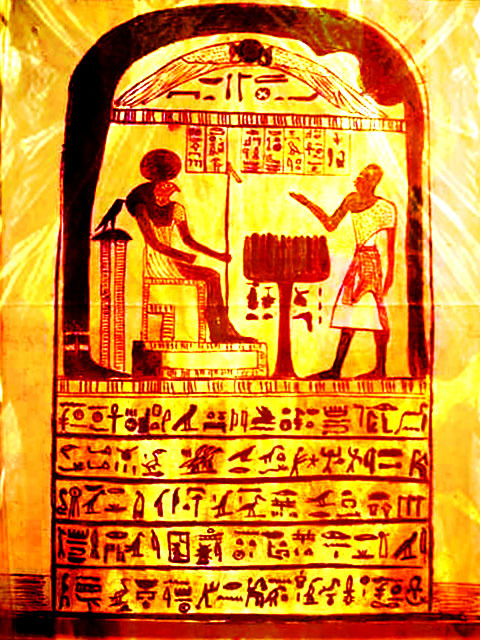
View On WordPress
#Abbey of Theleme#Aeon of Horus#age of Reason#Aleister Crowley#Alphonse Louis Constant#Argentum Astruum#Augustine of Hippo#Bavarian Illuminati#Early Church History#Early Church Theology#Eliphas Levi#Enlightenment era#Francesco Colonna#Francois Rabelais#Freemasonry#Gershem Scholem#greco-egyptian religion#Horus#Humanism#Hypnerotomachia Polyphilo#Isaac Luria#Isis#Karl von Eckhartshausen#Liber Oz#Lurianic Kabbalah#Osiris#Philosophy#Religion#Renaissance era#Renaissance Humanism
1 note
·
View note
Text


Ein Sof, emanation of the Sefirot and angelic hierarchies according to Lurianic Kabbalah
The Kabalistic term for the Deity prior to His self-manifestation in the production of the world, probably derived from Ibn Gabirol's term, "The Endless One" (she-en lo tiklah).
76 notes
·
View notes
Text
i used to really dislike the concept of "shards" in worm. at first i read them as being a kind of midichlorians for trauma. however i now isee them as something almost mystical. it represents that perfect middle space between medieval mysticism and enlightment rationalism that finds its apotheosis in hegel. i think of the way it mirrors the idea in lurianic kabbalah that at the time of the Fall adam's soul fractured into 6000 "shards" (one for each member of israel at sinai for the revelation), and that for israel to inaugurate olam haBa, the world to come, it is first necessary to "elevate" said soul-shards through mitzvot to their prelapsarian proximity to the godhead. this notion, obliquely, finds its christian (and therefore proto-hegelian) counterpart in the work of meister eckhart, who was the first to preach the doctrine that the center of humanity was in God Himself, not the individual soul. the rationalist version of this idea--that is to say, Hegelianism--would see God, or the Absolute, as the center of humanity. scion is therefore a kind of physical manifestation of the Absolute Spirit: parahumans are not separate individuals but modes of one rational entity, finding self knowledge through rational dialogue between elements of himself--through conflict. parahumans are all parts of one thing, headed inevitably for the End of History, total self-knowledge. shards represent a primordial oneness, a movement toward what french mystic rolland (who incidentally was the one to introduce to idea of "oceanic feeling" to freud), speaking of spinoza (himself another influence on hegel), might call "le soleil blanc de la substance," the white sun of substance, that is to say, a sense of the primordial oneness of all things, a sense of being part of a univocal God or Nature.
#wormblr#worm web serial#parahumans#shards#henghost's schizoposts#the edibles are fucking back baby#hegel#spinoza#kabbalah
37 notes
·
View notes
Text
Aziraphale is Lucifer, Sauntering Back Upward
There's an amazing meta post about Crowley being Lucifer, and it got me thinking about the nature of their own rebellions. I love the idea that Crowley is Lucifer, and I totally think it fits, but he's a a version of the Adversary seen through a very Jewish lens, possibly even placed there deliberately by God herself as a sleeper agent. (I'm not placing Good Omens God as the good guy here; the whole point of the show is that neither side is good or bad, they're just sides to be on.)
In Judaism, Ha-Satan is an Adversary in a way that translates to "The Opposing Advocate" or "The Prosecuting Attorney" (Hebrew is Really Old and only has so many words to convey concepts), and his actual job, as appointed by G-d, is Asking Questions. He's appointed to do that. He's one of the mazikim, an angel who does G-d's dirty work of testing, tempting, judging, and destroying (I know Neil knows what this is, he named a character that!). And why was Crowley placed as the Tempter of Man? Well, he's really good at asking questions. He was turned into a demon because he had a lot of questions.
The assumption is that this is a punishment.
Job also thought he was being punished, but he wasn't. He was being used as a test because he was such a great example. Crucially, the Jewish interpretation of this story is not about trusting G-d and being rewarded or whatever, it's "Being very good doesn't mean that you'll be rewarded on Earth, it means that you'll probably have an even harder time here because G-d is using you to prove something." The double livestock and children are not meant to be a reward, they are due compensation for damages. (The Mishnah says equal cost, but I think Pain and Suffering counts for an awful lot in this case, so it's only right that he gets twice the livestock.)
Whereas Aziraphale, actually? Is not only a Christian angel, but a Christian Lucifer who is sauntering very slowly downward. A Lucifer whose job is not to ask questions, but who actually tests the angels themselves and leads them to rebellion.
(Additionally, I think it's really funny that Aziraphale and Crowley are having the exact same argument as G-d and Satan in the Book of Job, which is that it's very easy to do the right thing if you're rich but hard if you're poor, but they pick a very poor person instead of a rich one and end up taking everything away from her, and she's tempted to suicide. Great job, Aziraphale. Proves my point.)
Let's look Before the Beginning.
The first line in Genesis is about G-d creating the heavens and the Earth. So this is obviously even before "Let there be light," Market Version. The Miltonian War in Heaven takes place before that, so obviously this is before the Earth even happens. So what's Crowley doing, speaking the Divine Command when the Earth isn't around yet?
Well, without God looking over his shoulder, he's setting the stage for things like matter and energy to even be able to exist before the Earth even has the conditions to form. He's disbursing the Divine Light that's contained in the now-shattered vessels of the Sfirot.
Rav Wikipedia sums it up thusly: 'Because the sephirot are pure and unrelated to each other at this stage, each attribute alone is unable to contain the enormity of the Divine light as it descends into them, and the "vessels" (Keilim) of the sephirot undergo a "shattering" (Shevirah), creating the World of "Chaos" (tohu). Their Divine light is released and reascends, while the broken vessel fragments descend, still animated by "sparks" (Nitzotz) of light."
So, Crowley summons that Divine Light, it Big Bangs out and shatters existence into being, and Divine Light shoots out all over the place. Now, in medieval Kabbalah, this separation was considered to be a result of humans sinning, but in Lurianic Kabbalah, which is a reaction to the very beginnings of the Spanish Inquisition (the thing that got Crowley so upset with humanity), it's a necessary part of Creation. Divine Sparks being trapped inside the shards of the vessels it was stored in and forgetting what they were is necessary for consciousness that's not just a part of G-d to exist.
That's Crowley's job. It's necessary. We used to believe this was a mistake, but turns out it's not! This cosmic separation is actually really important, otherwise the Divine Sparks cannot forget their origin and experience individual consciousness and thus free will.
"In the Lurianic scheme, Creation is initiated by a primordial radical Divine "self-withdrawal" (Tzimtzum), forming a figurative "empty space/vacuum" (Khalal) in which only an "imprint" (Reshimu) remains of the withdrawn Ein Sof."
Compare this to Crowley and Gabriel's discussion of their lack of memory feeling like a house where furniture used to be. But also, consider how out of touch Crowley is with the whole Divine Bureaucracy at this point. He's clearly been left alone to do his own thing and hasn't heard what's going on in the scheme of things.
So what's Aziraphale doing there? He's just blithely winging his way across empty space, a little spark of light, when Crowley calls out to him. He doesn't appear to be doing anything more urgent or important. He comes over, asks what's up, and Crowley gives him a task -- holding the blueprint while he activates it into existence by turning a crank. Crucially, Crowley needs somebody to help him bring existence, as imperfect and chaotic as it is, into a place where it can even start to think about being. Trapping the Divine Spark in matter.
This is real fuckin sexual. It suggests Hesiod's placement of Eros as an act of attractive, sexual love as the beginning of existence, but also it's a pretty obvious sexual pun.
(The Gnostics would identify Crowley as the Demiurge for this, but we're not talking about them. I don't think Neil is trying to do anything with Gnostic mythos here; it would be a lot more obvious if he was.)
What is Aziraphale's response to this? He's disappointed that Crowley is praising Creation instead of praising his own personal beauty. It's only a second, but wow, how petty can you be? Someone has just unleashed the full beauty of the first moments of existence before you and you're like, "Wait, I'm pretty, too!" I mean, you did just metaphorically cum existence into being and I guess you're stuck in the wet spot, you could use some aftercare.
That sounds a lot like Milton's Satan. He's the prettiest boy in Heaven, and his whole thing is that he's not impressed by humanity and they should be worshipping him instead of him having to serve them. Aziraphale is a little jelly of Creation from the very start. So jelly, in fact, that he starts talking shit about it. Oh, this? Yeah, it's not that important. It's just a backdrop for humanity. Yeah, some little apes on an unregarded little blue-green planet far out in the uncharted backwaters of the unfashionable end of the western spiral arm of the galaxy. That's what this is all about. Yeah, uh-huh, sucks to be you. Well, I wouldn't do anything stupid like raising a fuss about it. Oh, you're gonna? Ooh, don't, it's pretty dangerous. Little old angel like me could never. I don't even know what gravity is.
And yeah, maybe he was sent there to give Crowley the news in the first place, but still.
(@mischief-and-tea-by-the-sea , who suggested I tag @neil-gaiman , also points out that many interpretations suggest that Milton portrays the Fall as a Felix culpa or necessary fault, a planned thing like the shattering of the Divine Vessels in Lurianic Kabbalah -- both are necessary for independent consciousness to exist.)
God could have totally sent him to check up on Crowley, not just inform him of the new developments in the plan. Oh yeah, that one nerdy angel who got all geeked about nebulae. He's gonna flip his shit when he realizes this isn't going to run long enough for any new stars to form. Let's send my insecure little gay gossip over to see how he takes it. Ooh, he came right the fuck up to my office with a serious attitude. I mean, I don't wanna deal with that on a daily basis, but he's making some good points. I need to put him where I can use that attitude and also not have to deal with that attitude...
Not only that, but Aziraphale gives fire and the first weapon of war to Adam. These are traits identified with Prometheus and with Azazel, another name for Satan, in two different traditions.
One common interpretation of Milton is that his sympathetic Satan shares traits with Prometheus, acting as a bringer of enlightenment and a heroic figure to humanity, risking his angelic status for actions that will ultimately free humanity from the yoke of the gods. Prometheus risked the wrath of Zeus to give fire to the humans and was punished endlessly for it, and is prophesied to someday rise and do battle with the forces of Order at the end of time. Prometheus is also associated with the human brain and toolmaking (because of the fire), as well as being ultimately responsible for Pandora, the First Woman, who likewise doomed humanity because of her curiosity and disobedience of the gods.
According to the Book of Enoch, the angel Azazel, another name for Lucifer or Satan (I think by now it's pretty clear that Satan is just gonna be whichever angel is being an Adversary at the time, but w/e) was the leader of the Grigori, the angels who lusted after humans so much they decided to fuck them. Azazel personally taught them smithing and how to make weapons of war (and makeup; Aziraphale does love disguises and sleight of hand). Very Promethean. Aziraphale didn't Fall then, true, but he's also Human Gay. Possibly because his first individual experience was being attracted to (and, uh, Used for Cranking It until Creation exploded into being by) Crowley. Regardless of how much agency he had in his Gayness, he probably brought humanity the gift of Gay Sex and thus avoided having any Nefil babies that had to be drowned like half-tabby Siamese kittens in the Sandman, so he didn't Fall then either, but gee it was a narrow miss. He must have been worried about what else God could do to angels, which is why he was so terrified about his child-saving lie with Job.
(Of note is that literally the only remotely Biblical book that refers to an archangel rebelling directly against G-d for the Throne of Heaven is the Book of Enoch. Yep! Just there! It's not a Jewish belief at all, along with the idea of Original Sin or the snake being Satan--that is your Animal Urge, and it's necessary to live but you should not let it control your behavior, in Jewish thought.)
And the thing is that he does Fall a little after lying to God. She never speaks to him again, so he's left in constant doubt and has to be forced to make his own decisions, just like a demon. He obviously never tells any of the other angels, just Crowley. But you can see his anxiety about this constantly, and I bet there's a little part of him that wonders if he's actually Fallen and somehow nobody has noticed yet, but worries that the moment they do he'll be officially kicked out of Heaven. That's gotta be so, so bad for you.
But there he sits, acting as an angel, irritating the other angels to the point of extreme measures simply by being himself, the way that Crowley does to humans and other demons with lots of thought and cleverness.
He even offers Crowley the temptation to defy God's decision and take control in Heaven. Yeah, Crowley is horrified by the idea, but he's gotta stop and think about it for at least a moment, right? Crowley just didn't take it because he sees beyond the system. He already knows that the sides are bullshit in the same way I told my Christian classmates that they didn't need to worry about devils because they were really still just all angels and Hell was obviously a lie to keep them under control. (Mazikim!) Crowley wasn't tempted to take power because questioning the System is literally his job right now.
He obviously corrupted Gabriel by being so clearly in love and enjoying himself on Earth. Gabriel has his clothing tailored special and wants to save it, just like Aziraphale, even though he doesn't give a shit before. He wants to stop the Apocalypse and keep things status quo, even though he didn't before -- that's Aziraphale rubbing off on him. He wanted to meet his Hellish counterpart in a place where humans eat and drink, just like Aziraphale. And he decided that he was going to fall in love with his counterpart and even start enjoying music, just like Aziraphale, and face exile with graciousness just like Aziraphale.
Aziraphale literally tempted Gabriel to Fall. He didn't do it by asking questions, just by being himself. Enjoying things. Enjoying clothing and music and love and Earth and peace and the status quo. Indulging himself and his desires above serving God or, frankly, the humans. (Yeah, I know, he tries when he bothers, but he's still a lazy, petty bitch who prefers his personal drama and own sense of comfort to nearly everything else, and he barely tries to hide it. That's why we love him.)
And now?
Baby is Supreme Archangel. And he's gonna defy God about it. This is everything the Miltonian Lucifer ever wanted.
42 notes
·
View notes
Text
While the goal of life is ultimately to transcend the cycles of gilgul altogether, the Kabbalah likewise identifies certain great souls that reincarnate in each generation specifically to assist other souls on their journey or to rectify some past wrong. According to Lurianic tradition, for example, the soul of Abel was reborn as Moses while the soul of Cain was reborn as Jethro. The positive relationship between Moses and Jethro in the Exodus narrative thus rectifies their violent past, bringing about a repair, or tikkun, in their relationship and in the world at large.
I wanted to see what details existed about Jewish reincarnation so I was reading on my Jewish learning… obsessed with this
64 notes
·
View notes
Text
weeping wailing none of my roommates want to watch a video on the development of spiritual possession and exorcism as concepts in rabbinical Judaism and the rise of Lurianic Kabbalah in the 16th century with me. at nine pm on a sunday evening. whyever not
#stella might have joined me perhaps but she's having a fantastic time in japan#i'm joking they were already very good sports about watching an hbomberguy vid and then a monochrome photography video with me
16 notes
·
View notes
Text




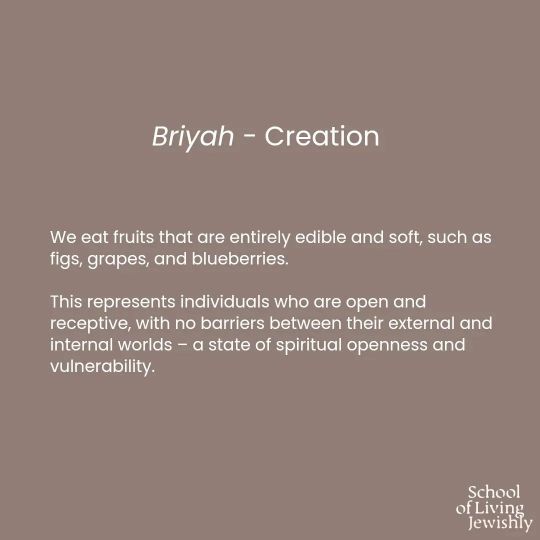


From Living Jewishly on Instagram
Like all Jewish tradition, the Tu B’Shvat Seder has evolved throughout the centuries.
This evolution has come to include the four worlds, which, in Lurianic Kabbalah, are the four levels of reality, from human consciousness to Divine reality.
These four worlds are connected to various fruits, and further root the Tu B’Shvat rituals in the land and bounty, emphasizing the divine nature of our lived reality, and connecting the physical with the spiritual.
2 notes
·
View notes
Text

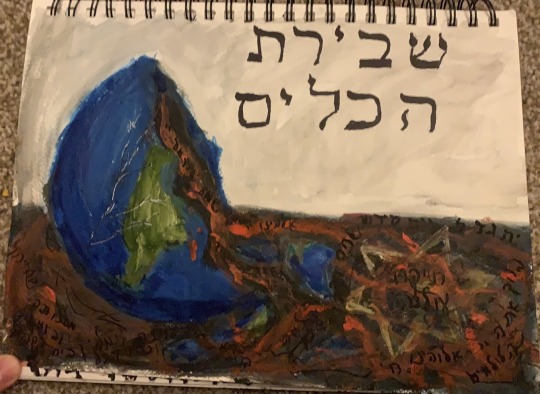
Two paintings of mine. The one above is from 2018, using India ink and watercolor (and gifted to my rabbi). The one below was created using gouache and watercolor.
The ideas presented in here draw from Lurianic Kabbalah. שבירת הכלים (shevirat ha-kelim) translates literally as “shattering the vessels,” and refers to the breakdown of the world into עולם הטהו, chaos, and our spiritual (and as diaspora jews, literal) exile. תיקון עולם, (Tikkun olam, the repairing of the world) refers to the correction of that process, through mitzvot or good deeds.
ID: two paintings. The one on top features a hand, attempting to hold together a cracking globe. Black liquid trickles down the forearm, presumably from the cracks in the globe. Beneath the hand is written “ת׳קון עולם״”
The painting below features a globe, broken in half, the more intact piece filled with cracks. Red and black liquid swirls out of and around it, and words to several Hebrew prayers can be seen “floating” amongst it. A Star of David can be seen to be partially submerged by it. Overhead, ״שבירת הכלים״ is written.
7 notes
·
View notes
Text
"Ein Sof, or Eyn Sof (/eɪn sɒf/, Hebrew: אין סוף), in Kabbalah, is understood as God prior to any self-manifestation in the production of any spiritual realm, probably derived from Solomon ibn Gabirol's (c. 1021 – c. 1070) term, "the Endless One" (she-en lo tiklah). Ein Sof may be translated as "unending", "(there is) no end", or infinity.[1] It was first used by Azriel (c. 1160 – c. 1238), who, sharing the Neoplatonic belief that God can have no desire, thought, word, or action, emphasized by it the negation of any attribute. Of the Ein Sof, nothing ("Ein") can be grasped ("Sof"-limitation). It is the origin of the Ohr Ein Sof, the "Infinite Light" of paradoxical divine self-knowledge, nullified within the Ein Sof prior to creation. In Lurianic Kabbalah, the first act of creation, the Tzimtzum self "withdrawal" of God to create an "empty space", takes place from there. In Hasidic Judaism, the Tzimtzum is only the illusionary concealment of the Ohr Ein Sof, giving rise to monistic panentheism. Consequently, Hasidism focuses on the Atzmus divine essence, rooted higher within the Godhead than the Ein Sof, which is limited to infinitude, and reflected in the essence (etzem) of the Torah and the soul."

1 note
·
View note
Text
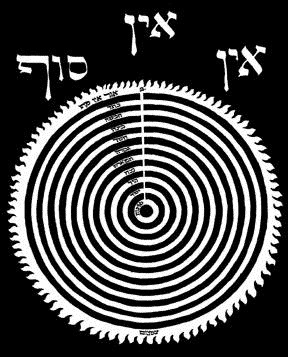
Ein Sof, or Eyn Sof (/eɪn sɒf/, Hebrew: אֵין סוֹף ʾēn sōf; meaning "infinite", lit. '(There is) no end'), in Kabbalah, is understood as God prior to any self-manifestation in the production of any spiritual realm, probably derived from Solomon ibn Gabirol's (c. 1021 – c. 1070) term, "the Endless One" (she-en lo tiklah). Ein Sof may be translated as "unending", "(there is) no end", or infinity. It was first used by Azriel (c. 1160 – c. 1238), who, sharing the Neoplatonic belief that God can have no desire, thought, word, or action, emphasized by it the negation of any attribute. Of the Ein Sof, nothing ("Ein") can be grasped ("Sof"-limitation). It is the origin of the Ohr Ein Sof, the "Infinite Light" of paradoxical divine self-knowledge, nullified within the Ein Sof prior to creation. In Lurianic Kabbalah, the first act of creation, the Tzimtzum self "withdrawal" of God to create an "empty space", takes place from there. In Hasidic Judaism, the Tzimtzum is only the illusionary concealment of the Ohr Ein Sof, giving rise to monistic panentheism. Consequently, Hasidism focuses on the Atzmus divine essence, rooted higher within the Godhead than the Ein Sof, which is limited to infinitude, and reflected in the essence (etzem) of the Torah and the soul.
#Ein Sof#God#infinite#symbols#esoteric#Kabbalah#space#star#Infinite Light#Endless#sun sign#space sign
0 notes
Text
On the Nature of the Qlippoth
“Since the demons aren’t summoned anymore, they are coming by themselves.”
— MÜLLER-STERNBERG, P.9
Maybe it's an internal medicine problem. Maybe you have an imbalance internally that your own brain cannot regulate or make balanced.
1. The Tree of Death
The dark side of the Etz Chiim is also called the Tree of Death and considered to represent the reverse or occult side of the Tree of Life. It is a diagram of the evil forces or Qliphoth (Hebrew for shells) assigned to each Sephiroth. They represent the counter-forces of the ten divine emanations as described in Lurianic Kabbalah. The Tree of Death, however, essentially is a creation of 20th century Western occultism rather than genuine Jewish Kabbalah. The orthodox origin of the Qliphoth according to Lurianic Kabbalah is described in an abbreviated version in the last chapter of this page.
Below you can see the Tree of Life and Tree of Death side by side. Imagine them as two sides of one coin, with hidden pathways connecting their front and back (or better: inverted side) with each other.
It is for the sake of illustration. They are not conjoined twins, sharing two minds, two souls, two free wills, but only one body.

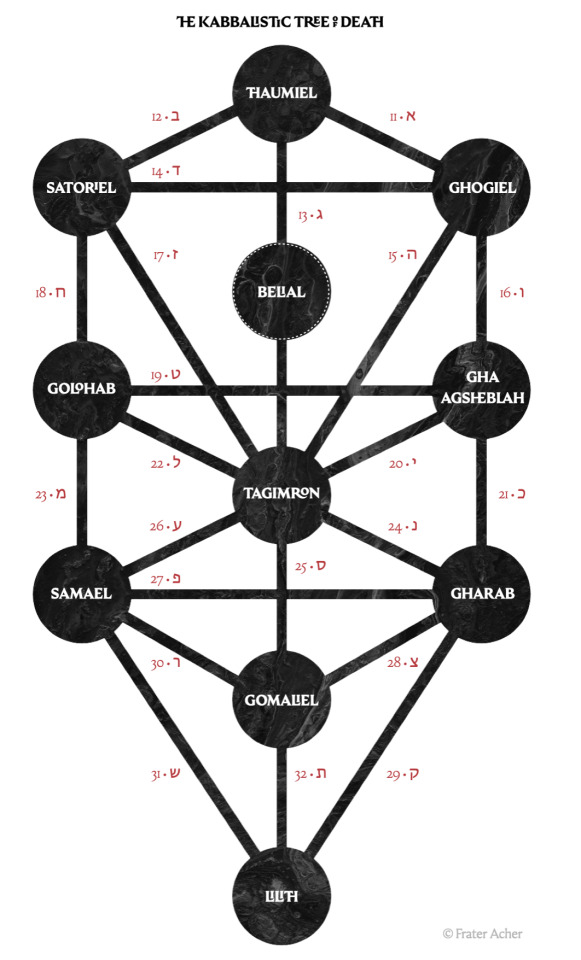
When God needs directions inside your body's inner temple crawling around like an ant in an ant hill to locate and help fix things if he so decides.
My opinion is, it is unknown, and an effort to describe an unexplained phenomena, with evil at it's core.
As to it's "top secret" inaccessibility, thats the jews. They are up in the world's librarys more than anybody else.
It could be viewed or be considered to having nuclear technology before gunpowder ever existed and keeping it to themselves.
This is what is known to happen to you if you try to pursue any information and how far did you try to go there?
Being diametrically opposed to you, no matter what direction you face, and attempting to overpower or subdue in the cosmic positive and negative numbers game.
Or maybe the jackass piloting the human vessel has his wires crossed/inverted on his x/y axis Playstation controller.
Nyuk nyuk.
0 notes
Text
Mosiah Chapter 22. "The Back Door."

Plans are made for the people to escape from Lamanite bondage—The Lamanites are made drunk—The people escape, return to Zarahemla, the "the place of the dawning, the Village of the Enlightened," and become subject to King Mosiah "Mouth of God". About 121–120 B.C.
The people grow weary of giving half of everything to their bad habits, their savage slavemasters, the Ignorances, AKA the Lamanites, but don't know how to deliver themselves without violence. They plan to leave prison like the Jews in the Book of Exodus, except they are leaving a bungler king behind to become subject to one that is more gifted. For this to work they are going to have to press the wine:
1 And now it came to pass that Ammon "the knower of the sun's secrets" and king Limhi "the refuge" began to consult with the people how they should deliver themselves out of bondage; and even they did cause that all the people should gather themselves together; and this they did that they might have the voice of the people concerning the matter.
Amm= keeper of secrets
on= pillar of the sun
2 And it came to pass that they could find no way to deliver themselves out of bondage, except it were to take their women and children, and their flocks, and their herds, and their tents, and depart into the wilderness; for the Lamanites being so numerous, it was impossible for the people of Limhi to contend with them, thinking to deliver themselves out of bondage by the sword.
3 Now it came to pass that Gideon "the hewer" went forth and stood before the king, and said unto him: Now O king, thou hast hitherto hearkened unto my words many times when we have been contending with our brethren, the Lamanites.
4 And now O king, if thou hast not found me to be an unprofitable servant, or if thou hast hitherto listened to my words in any degree, and they have been of service to thee, even so I desire that thou wouldst listen to my words at this time, and I will be thy servant and deliver this people out of bondage.
5 And the king granted unto him that he might speak. And Gideon said unto him:
6 Behold the back pass, through the back wall, on the back side of the city. The Lamanites, or the guards of the Lamanites, by night are drunken; therefore let us send a proclamation among all this people that they gather together their flocks and herds, that they may drive them into the wilderness by night.
The back door and back wall, which never face the sun are habits of ignorance, of maintaining the desires of the ego. The only way to get the ignorances to leave one in peace is to turn it out of its hiding in the back of the house with what is called Mezuzah, to invoke the Presence of God:
In order to allow for the existence of beings that would not be absorbed and nullified in the Source, G‑d chose to conceal and withdraw His light to create, so to speak, a "vacuum" where created beings would feel their independent existence.
This, in oversimplified form, is the fundamental concept of tzimtzum (the concealment and contraction of the primordial Divine light, which is the cornerstone of Lurianic Kabbalah). The concept of tzimtzum demonstrates how a monistic creation can lead to apparent dualism.
The absence of light, of course, allows the possibility for darkness — or evil. Our task is to discover G‑d hiding, as it were, behind a veil of darkness:
7 And I will go according to thy command and pay the last tribute of wine to the Lamanites, and they will be drunken; and we will pass through the secret pass on the left of their camp when they are drunken and asleep.
8 Thus we will depart with our women and our children, our flocks, and our herds into the wilderness; and we will travel around the land of Shilom. "Refuge for all mankind."
9 And it came to pass that the king hearkened unto the words of Gideon.
10 And king Limhi caused that his people should gather their flocks together; and he sent the tribute of wine to the Lamanites; and he also sent more wine, as a present unto them; and they did drink freely of the wine which king Limhi did send unto them.
11 And it came to pass that the people of king Limhi did depart by night into the wilderness with their flocks and their herds, and they went round about the land of Shilom in the wilderness, and bent their course towards the land of Zarahemla, (another word for Jerusalem) being led by Ammon and his brethren.
12 And they had taken all their gold, and silver, and their precious things, which they could carry, and also their provisions with them, into the wilderness; and they pursued their journey.
13 And after being many days in the wilderness they arrived in the land of Zarahemla, and joined Mosiah’s people, and became his subjects.
14 And it came to pass that Mosiah received them with joy; and he also received their records, and also the records which had been found by the people of Limhi.
15 And now it came to pass when the Lamanites had found that the people of Limhi had departed out of the land by night, that they sent an army into the wilderness to pursue them;
16 And after they had pursued them two days, they could no longer follow their tracks; therefore they were lost in the wilderness.
To be lost for two days is to drown in the Flood of Noah, never to return unless you give up the pursuit of violence. Gideon's plan to press the wine and get the ignorances drunk was a non-violent way of rescuing the future generations from a life lost in the forest.
We have covered how pressing the wine and getting drunk is the wages of the wine, the same is true of pressing the unknown "the night time" for knowledge of God, "the daytime."
First, the City of the Enlightened in the East, where the Sun of awareness rises. If it were us, we would see we have allowed a bunch of savages to keep us in the dark, and the wine that would wake us up so speak would be the Heat Belt, caused by Donald Trump's seismic mines, Border Wall with Mexico and Vladimir Putin's war against Ukraine.
All of which were optional for humanity at least before we allowed these dipshits to take power, power they ended up being incapable of managing.
By cheating Donald Trump into the White House, you Mormon Mother Fuckers, you pretty much murdered this planet. And the DOJ knew he cheated and so did the Secret Service and all of his "Faith Leaders" knew he cheated, and nothing was done. And just look at us now.

This uncscrupulous behavior has put our lives at risk. Is it enough? That our country is going to be burnt to death because a few freaks couldn't bother to participate in a legal election process? Are we now convinced of the importance of this? Or should another day pass, much the same as it did yesterday and the night before that?
0 notes
Text
2 Chronicles 4: 7-11. "The Mezuzah."

7 He made ten gold lampstands according to the specifications for them and placed them in the temple, five on the south side and five on the north.
We just discussed how one greets God, Baruch Hashem, Baruch Adonai, "I kneel before the one who sees and knows all."
To see what is unseen and to know it as if one has always known it is to surpass the North and South Pillars. There are Five Commandments for the North, there are Five pertaining to the South.
The first five pertain to things whose origins are not seen. The second pertain to what is seen.
8 He made ten tables and placed them in the temple, five on the south side and five on the north. He also made a hundred gold sprinkling bowls.
Tables represent the leverage of one's Jewish Nature from the dining room table outward:
What is the symbolism of the shulchan? How do we experience the shulchan in our lives today?
According to the Zohar, the shulchan was what brought blessing of sustenance to the tables of the whole world. According to the Talmud, the crown around the shulchan is symbolic of royal wealth, which King David deserved and received.
How can we harness these blessings in our own lives? By taking a deeper look at the shulchan and its parts, we find hints.
First, you have a table. The table is the center of the home; therefore, it is symbolic of the home itself, the center of Jewish life. Laden with pure gold and surrounded with a royal crown, it points to our dress and sense of dignity. How do we act? Do we see ourselves as ordinary, and thus dress and act that way? Or do we see ourselves as the royalty we are—the children of G‑d, the King of Kings—and act accordingly?
The way we see ourselves affects the way we act. The way we act controls the spigot of blessing to our homes. To see how one's actions affect one's reflection requires contrast with the illumination of the Ten Decrees which are first taught by example in the home and from the society in which it is founded.
Sprinkling bowls hold the demoniac nature which is exorcised during exposure to the Lamps which are arrayed on the tabletops and trap it. These sound handy for when you want to kill your boyfriend.
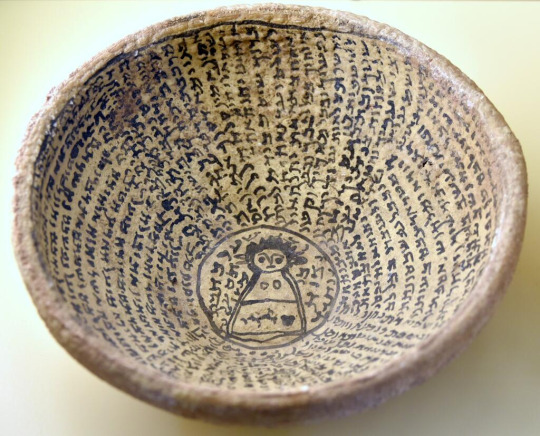
9 He made the courtyard of the priests, and the large court and the doors for the court, and overlaid the doors with bronze. 10 He placed the Sea on the south side, at the southeast corner.
The Courtyard is the rest of the world, the large court and the doors are one's heritage, indicated by what is called a Mezuzah, a coat of arms that blessed one's friends and curses one's enemies. Both are born of free will, both unveil the Presence of God who hides Himself within His mysterious ways. The reverse is never possible. Man cannot hide his nature from God or others for too long.
The Mezuzah reminds us of this when we enter another's home.
According to the Tosafot and the Shulchan Aruch, the main function of the mezuzah is to protect the house from evil. Because of this attribute, the mezuzah has been called "the coat of arms in the knighthood of G‑d." To begin to understand the mechanism of this effect of the mezuzah, we must first delve into the concept of evil itself.
Evil was created ex nihilo just as the rest of Creation. It was not created for its own sake, however, but only as an instrument of free choice. It is tolerated to the extent that it serves this purpose.
In order to allow for the existence of beings that would not be absorbed and nullified in the Source, G‑d chose to conceal and withdraw His light to create, so to speak, a "vacuum" where created beings would feel their independent existence. This, in oversimplified form, is the fundamental concept of tzimtzum (the concealment and contraction of the primordial Divine light, which is the cornerstone of Lurianic Kabbalah). The concept of tzimtzum demonstrates how a monistic creation can lead to apparent dualism.
The absence of light, of course, allows the possibility for darkness — or evil. Our task is to discover G‑d hiding, as it were, behind a veil of darkness.
11 And Huram "one's spiriitual ancestor" also made the pots and shovels and sprinkling bowls.
The pots, shovels, and sprinkling bowls represent the Three Stages of Jewish translation of the Tanakh into one ongoing state.
The pot is the Kohathite stage when one must be obedient with very little questioning. A pot is only as good as what it allows itself to be filled with.
The shovel is the Levite stage where one puts earth on the grave of the past. Levites like Moses and Aaron, who led us out of Egypt without ever being a part of Egypt are examples of shovels.
The sprinkling bowls represent the Israelite stage and signify the emptying of the traits of one's character that do not reflect the 12 Noble Skills.
But first we must enter the Temple, the House of the God of Israel and this requires the blessing of the Mezuzah:
Barukh atah Adonai, Elohaynu, melekh ha-olam, asher keedishanu b'meetzvotav v'tzeevanu leek'boa mezuzah.
Blessed are you, Lord, our God, King of the universe, who has sanctified us with God's commandments and commanded us to affix a mezuzah.
0 notes
Video
youtube
Liked on YouTube: Evil in Early Kabbalah - Emanations of the Left Hand Side - Origins of the Qliphoth / Klippot || https://www.youtube.com/watch?v=UcEEugkkiuQ || The origin, nature and final destiny of Evil is one of the central concerns for theologians, philosophers and mystics. Developments in early Kabbalah (c. 13th. century) made for a dramatic and daring re-conception of Evil as beginning within the dynamism of the divinity itself. This episode explores one of the earliest texts about this new Kabbalistic theory of Evil, the Treatise on the Emanations of the Left or Ma'amar Ha-Atzilut Ha-Sma'lit. This difficult and obscure texts details the origins of Evil, Demons and their final destiny as understood in one of the earliest strata of Kabbalah and serves as the foundation for the later development of the Klippot in later Lurianic Kabbalah. #kabbalah #klippot #jewishdemonology Recommended Readings: Treatise on the Emanations of the Left ( Ma'amar Ha-Atzilut Ha-Sma'lit) in Dan - Early Kabbalah - 978-0809127696 Tishby - The Wisdom of the Zohar (esp. volume II) - 978-1874774280 Scholem - On the Mystical Shape of the Godhead - 978-0805210811 Wolfson - Light through Darkness: The Ideal of Human Perfection in the Zohar - https://ift.tt/10qbzNL Idel - Primeval Evil in Kabbalah - 978-1602804036
0 notes
Text
Self.
You don't need to personally reconcile Lurianic Kabbalah with Valentian and Thelema for a Tumblr RP.
Try to keep your jokes fucking comprehensible.
7 notes
·
View notes